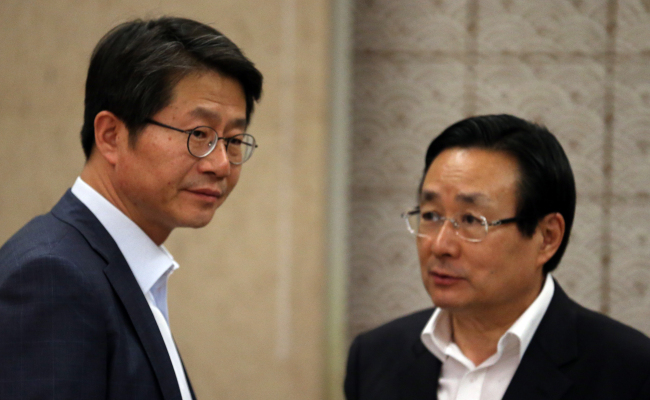The two Koreas face tough negotiations in their first high-level government talks since 2007 to begin in Seoul Wednesday.
The two-day meeting comes as South seeks to kick-start its trust-building drive while the North is striving to mitigate international pressure over its nuclear program.
Each five-member delegation will meet at the Grand Hilton Seoul hotel to discuss the resumption of the joint industrial park in Gaeseong, tours to Mount Geumgang and reunions of separated families, and other pending issues.
The North Korean side will travel to Seoul by land across the tense military demarcation line.
Although Seoul hopes to capitalize on the rare chance for dialogue to reset the bilateral ties strained by Pyongyang’s military adventurism, uncertainty still remains high over the outcome of the talks due to their gaps in perception over the issues.
Before the talks, the major bone of contention was who would lead each delegation.
Seoul initially planned to have its unification minister to lead its side, but decided to match the level of Pyongyang’s delegation chief as the North insisted it would not send a minister-level official. The two sides were to exchange the list of their delegates later in the day.
The Park Geun-hye government plans to approach lighter issues including humanitarian ones before moving onto tougher issues such as security as part of its step-by-step trust-building process.
But Pyongyang seeks to deal with a comprehensive range of issues including jointly hosting the events to mark the June 15 inter-Korean declaration signed in 2000 and the July 4th joint statement signed in 1972, and exchanging civilians.
During the talks, both sides might take caution over the issue of denuclearization -- the most critical issue for the bilateral relationship –- given that it is not the main agenda item. But Seoul is expected to reiterate its opposition to the North’s nuclear ambitions.
“For inter-Korean relations to develop, there should be progress on the denuclearization issue,” Foreign Ministry spokesman Cho Tai-young told reporters. “Our government will continue to urge the North to show sincerity by its decision to uphold international obligations and commitments with regard to denuclearization.”
The focus of the talks is expected to be reviving bilateral economic cooperation that has virtually ended after the suspension of the Gaeseong industrial complex in April. The so-called May 24 measures, put in place after the North’s torpedoing of the corvette Cheonan in March 2010, have seriously diminished bilateral cooperation.
For the cash-strapped North, reactivating the factory park is critical as it seeks to shore up the moribund economy and address chronic food shortages which could add to public anger over the fledgling Kim Jong-un regime.
The Gaeseong park was a vital source of hard foreign currency for the regime, which has been put under deeper international isolation following its nuclear test in February and long-range rocket launch in December.
Seoul is expected to demand Pyongyang sign a legally binding commitment to be held responsible should it unilaterally suspend the operation of the industrial park where 123 South Korean firms had run its labor-intensive factories.
The resumption of the tours to the mountain resort off the North’s east coast is a more complicated issue as Seoul has sought to secure Pyongyang’s guarantee to ensure the safety of tourists.
The tour program was halted after halted after a North Korean solider shot dead a South Korean tourist who strayed into an off-limits zone around the resort in July 2008.
Over the issue of jointly celebrating the landmark joint inter-Korean declarations, the two sides also remain at odds.
Pyongyang appears to prioritize those events as it believes the joint celebrations would be to uphold the late former leaders’ wishes. Some critics here argue the events could be utilized to fuel conflicts in an ideologically divided South Korea.
Attention is also being drawn to whether Seoul would lift the May 24 measures under which it imposed bans on South Koreans traveling to the North, inter-Korean trade, new investments in the North and North Korean ships operating in the South.
Experts said when there was no progress in the North’s denuclearization efforts, it would be burdensome for Seoul to lift these sanctions. Some argue the lifting of the measures would run counter to and weaken international sanctions to punish the North for its nuclear development.
By Song Sang-ho (
sshluck@heraldcorp.com)




![[Herald Interview] 'Trump will use tariffs as first line of defense for American manufacturing'](http://res.heraldm.com/phpwas/restmb_idxmake.php?idx=644&simg=/content/image/2024/11/26/20241126050017_0.jpg)

![[Health and care] Getting cancer young: Why cancer isn’t just an older person’s battle](http://res.heraldm.com/phpwas/restmb_idxmake.php?idx=644&simg=/content/image/2024/11/26/20241126050043_0.jpg)

